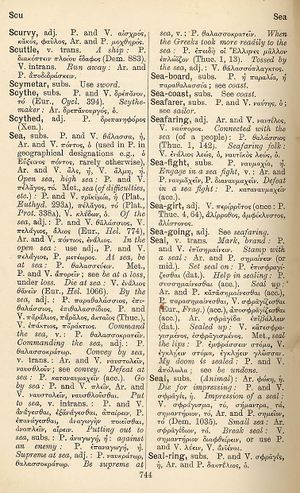sea: Difference between revisions
οὐχ οὗτός ἐστιν ὁ τοῦ τέκτονος υἱός; οὐχ ἡ μήτηρ αὐτοῦ λέγεται Μαριὰμ καὶ οἱ ἀδελφοὶ αὐτοῦ Ἰάκωβος καὶ Ἰωσὴφ καὶ Σίμων καὶ Ἰούδας; → “Isn't he the carpenter's son? Isn't his mother's name Mary, and aren't his brothers Jacob and Joseph and Shimon and Judah? (Matthew 13:55)
(CSV5) |
m (Text replacement - "<b class="b2">Euthyd.</b>" to "''Euthyd.''") |
||
| Line 6: | Line 6: | ||
<b class="b2">Open sea, high sea</b>: P. and V. [[πέλαγος]], τό. | <b class="b2">Open sea, high sea</b>: P. and V. [[πέλαγος]], τό. | ||
Met., <b class="b2">sea</b> (<b class="b2">of difficulties, etc.</b>): P. and V. [[τρικυμία]], ἡ (Plat., | Met., <b class="b2">sea</b> (<b class="b2">of difficulties, etc.</b>): P. and V. [[τρικυμία]], ἡ (Plat., ''Euthyd.'' 293A), [[πέλαγος]], τό (Plat., ''Prot.'' 338A), V. [[κλύδων]], ὁ. | ||
<b class="b2">Of the sea</b>, adj.: P. and V. [[θαλάσσιος]], V. [[πελάγιος]], [[ἅλιος]] (Eur., ''Hel.'' 774), Ar. and V. [[πόντιος]], [[ἐνάλιος]]. | <b class="b2">Of the sea</b>, adj.: P. and V. [[θαλάσσιος]], V. [[πελάγιος]], [[ἅλιος]] (Eur., ''Hel.'' 774), Ar. and V. [[πόντιος]], [[ἐνάλιος]]. | ||
Revision as of 11:51, 7 August 2017
English > Greek (Woodhouse)
subs.
P. and V. θάλασσα, ἡ, Ar. and V. πόντος, ὁ (used in P. in geographical designations e. g., ὁ Εὔξεινος πόντος, rarely otherwise), Ar. and V. ἅλς, V. ἅλμη, ἡ.
Open sea, high sea: P. and V. πέλαγος, τό.
Met., sea (of difficulties, etc.): P. and V. τρικυμία, ἡ (Plat., Euthyd. 293A), πέλαγος, τό (Plat., Prot. 338A), V. κλύδων, ὁ.
Of the sea, adj.: P. and V. θαλάσσιος, V. πελάγιος, ἅλιος (Eur., Hel. 774), Ar. and V. πόντιος, ἐνάλιος.
In the open sea: use adj., P. and V. πελάγιος, P. μετέωρος.
At sea, be at sea: P. θαλασσεύειν.
Met., P. and V. ἀπορεῖν; see be at a loss, under loss.
Die at sea: V. ἐνάλιος θανεῖν (Eur., Hel. 1066).
By the sea, adj.: P. παραθαλάσσιος, ἐπιθαλάσσιος, ἐπιθαλασσίδιος, P. and V. παράλιος, πάραλος, ἀκταῖος (Thuc.), V. ἐπάκτιος, παράκτιος.
Command the sea, v.: P. θαλασσοκρατεῖν.
Commanding the sea, adj.: P. θαλασσοκράτωρ.
Convey by sea, v. trans.: Ar. and V. ναυστολεῖν, ναυσθλοῦν; see convey.
Defeat sea: P. καταναυμαχεῖν (acc.).
Go by sea: P. and V. πλεῖν, Ar. and V. ναυστολεῖν, ναυσθλοῦσθαι.
Put to sea, v. intrans.: P. and V. ἀνάγεσθαι, ἐξανάγεσθαι, ἀπαίρειν, P. ἐπανάγεσθαι, ἀναγωγὴν ποιεῖσθαι, ἀναπλεῖν, αἴρειν.
Putting out to sea, subs.: P. ἀναγωγή, ἡ; against an enemy: P. ἐπαναγωγή, ἡ.
Supreme at sea, adj.: P. ναυκράτωρ, θαλασσοκράτωρ.
Be supreme at sea, v.: P. θαλασσοκρατεῖν.
When the Greeks took more readily to the sea: P. ἐπειδὴ οἱ Ἕλληνες μᾶλλον ἐπλώϊζον (Thuc. 1, 13). Tossed by the sea, adj.: V. θαλασσόπλαγκτος.

